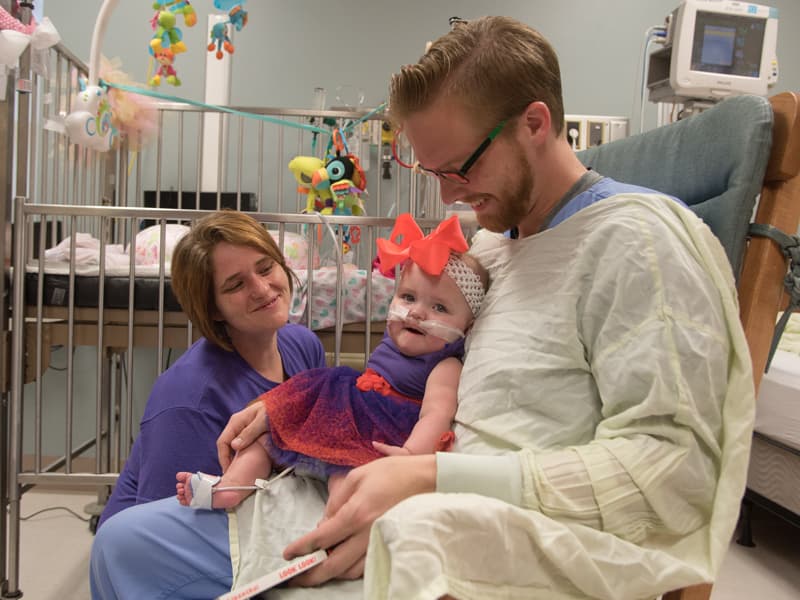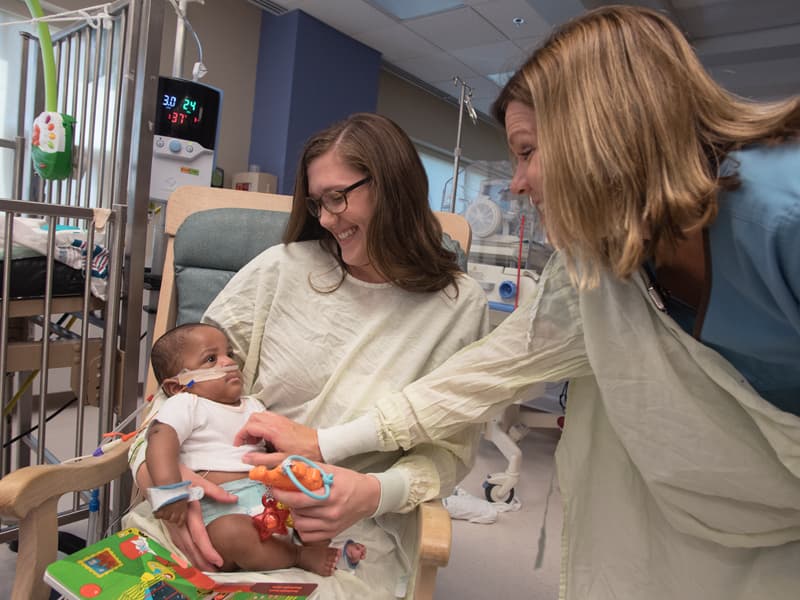Occupational therapy students 'rock' NICU volunteer program

For the first 14 months of her daughter Deavannah’s life, Deanna Bass wasn’t able to rock, hold or comfort her baby as often as she would have liked.
Last Thursday, on the very day that Deavannah was to finally be discharged from the Neonatal Intensive Care Unit in the Winfred L. Wiser Hospital for Women and Infants, Bass wrote these words for those volunteers who helped read to, speak to and generally provide the tender, loving attention her daughter needed to work toward her developmental milestones:
“Thank you all for what you do – taking time out of your day to show love to our little one . . . Thank you for rocking and showing attention to Deavannah while I’m away to work, or if my Mom and I both can’t be here.
“It means a lot to know she is being well taken care of.”
For years, members of the Junior League of Jackson have participated in the “Rocking Mamas” program in the NICU at the University of Mississippi Medical Center. Last June, the program expanded and was renamed the "Rock and Hold" program. The program has welcomed a new wave of recruits – second-year occupational therapy students – in what has grown to become a truly symbiotic relationship.
At the behest of Katie McAuley, an occupational therapist in Batson Children’s Hospital, School of Health Related Professions administrators and NICU administrators gave the green light to her plan that allows OT2 students to interact with infants in the NICU.
Why OT students rather than other disciplines?
“The OT students have so much training in child development and pediatrics,” McAuley said. “This is expanding the knowledge these students are getting in the classroom. It’s an opportunity for them to put into practice what they have learned.”
Sonny Gunn, an OT2 student who had the opportunity to rock and hold Deavannah during her last day in the NICU, said the program provides a first-hand look at what he’s learned in class.
“You can only learn so much in the classroom, but having hands-on experience, being able to talk directly to the nurses and other staff, to really get the experience that helps you apply what you have learned in the classroom, is invaluable,” Gunn said. “Just getting used to all the tubes and equipment, handling these little children who are so fragile. I’m a lot more confident than I was when I started.
“Something I’d never considered is how tight-knit members of the NICU team are – nurses, OTs, physical therapists, residents, the doctors themselves, and others – that type of collaboration working towards one patient was really encouraging to me.”
According to McAuley, the infants benefit from the interaction in many ways.
“When volunteers hold the babies, they read to them. Each baby in the NICU gets an age-appropriate book to take home with them. We look at their visual skills, their interaction, we see the baby smiling at the volunteers. The babies also get the appropriate sensory stimulation.
“We incorporate developmental things – visual, touching, reaching, grasping – basic developmental tasks.”

Lorraine Street, professor of occupational therapy in SHRP, said the program can help little ones learn how to relate to others.
“You just can’t replace the calming movement from rocking and from being rocked while the baby is swaddled or being held in someone’s arms,” Street said. “Babies who are premature haven’t spent as much time in their mothers’ bodies and they miss out on the squeezing and holding of their mothers.
“It develops relationship, the sense of comfort, it soothes them, it makes them calm – it’s really important for babies to help them get to sleep or help them alter their state from being upset to being calm.”
McAuley said the infants who participate in the program are carefully selected by a multidisciplinary team that meets weekly in the NICU to consider each baby’s specific needs. She said each child’s care provider must personally write the order, and each baby also must meet specific criteria, including:
- they have to be in a crib,
- they can’t be on isolation precautions,
- they have to be medically stable and
- the parent(s) has not opted out of the program.
“Parents are educated by NICU staff on the benefits of rocking and holding,” McAuley said.
The students’ hands-on education begins with a tour of the NICU. They are asked to devote at least two hours per week to the Rock and Hold program.
“For the most part, the students are excited and eager,” McAuley said. “There are some obstacles, of course – if the baby has had a rough day or isn’t feeling well, then they can’t be rocked or held.
“The NICU staff understands what these babies need, but they’re managing all their medical needs all the time. To have someone just sit there and be with the baby in a comforting way – not a medical way – is good for that baby’s soul.”
Street said UMMC is one of only two clinical sites in Mississippi that can provide an NICU experience for OT students.
“Over 30 percent of our entire profession in the U.S. works with children,” Street said. “Working with children requires understanding of what happens before childbirth and after childbirth. A lot of children they see have had some degree of prematurity or some medical issue. The NICU experience helps them better understand the disabilities they see down the road, where the baby comes from and why they’re having the problems they’re having.
“A lot of our students say they want to work around babies, but most of them haven’t been around babies since they were a child. It’s important for them to think what it’s like for the babies and for their families who can’t be with the babies all the time – to think what it’s like to have someone else take care of their babies.”
Gunn, who admittedly had little-to-no experience with babies, said the prospect of being around little ones intrigued him.
“I had worked with kids before, but before this experience, I had never considered working with NICU babies,” Gunn said. “For me, there’s a good feeling you’re doing something nice for someone. It’s definitely put a career working in the NICU on my radar.”
Last summer, 20 OT2 students volunteered for the program and went through basic training for infection control and safety, according to Megan Ladner, assistant professor of occupational therapy.
“We’ve had a waiting list of students who want to be a part of this program,” Ladner said. “We kept it small in the beginning so we could manage it better."
Occupational therapy’s transition to a doctoral program in 2018 makes participation in Rock and Hold paramount, according to Street.
“One of our primary goals in moving to an advanced degree is sending students out with a great deal of value-added expertise,” she said. “What we’re hoping is we will be able to develop a clinical rotation that’s devoted to the NICU and high-risk as a pediatric specialty.
“As our students get more experience doing this, it’s helping us as faculty to know what we need to teach and what they need to know from a real-world perspective.”
The Rock and Hold program’s increasing popularity with OT students virtually guarantees more babies like Deavannah will have the opportunity to grow and develop despite having a rocky start to life.
“It is awesome someone is here in the NICU loving on the ones who don’t have as much company,” Bass wrote. “Again, we thank you for your time and effort. We love each and every one of you.”


